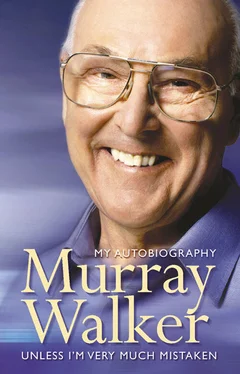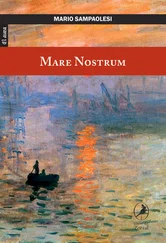I conveniently cannot remember what Damon said in the car but he came up to me afterwards and said, ‘Murray, do something for me will you?’
‘Anything, Damon. What is it?’
‘In future just keep your mouth shut, will you?!’
Another Williams success, Portugal 1990, was even more embarrassing. After a brilliant victory ahead of Senna and Prost, Nigel Mansell made his way to the interview room standing in the back of an open car, waving to the crowd, and hit his forehead on a steel beam. He staggered in and sat down as the cameras started rolling. ‘Nigel,’ I said. ‘First of all, will you carefully and slowly take your cap off. You’ve got an enormous bump on your head. Can you let them see it? Right up there’ … and stuck my outstretched finger right into the middle of it. It’s a clip that’s been shown dozens of times and it never fails to raise a laugh. I hope my life story is even half as entertaining … and rather less painful.
CHAPTER ONE A Proud Brummie
People think of me primarily as a commentator and yes, to my continual amazement, I’ve been one for well over half a century. But for the first 59 years of my life it was very much a second string to my ‘proper job’ in advertising and to be honest I sort of blundered into it, partly out of desire and partly because of circumstances at the time. Did heredity play a part or was it just the environment in which I was brought up? It’s impossible to tell. But of one thing I’m sure. A lot of my characteristics come from my mother and maybe even more from my father.
My mother was the daughter of Harry Spratt, a well-to-do draper and gents outfitter (as they used to call them in the 1920s) who owned businesses in the market town of Leighton Buzzard, Bedfordshire. She had a pretty idyllic upbringing amidst a loving atmosphere in a fine home with servants, horses and stables, and she seems to have wanted for nothing. She was an extremely attractive woman, both physically and personally, had a very strong personality, was very much the belle of the local ball, very feminine and great fun. But she was also extremely bright, pragmatic and good with money, being a very nifty operator on the Stock Exchange. She created a wonderful home for me to grow up in, I loved her dearly and suspect that her influence resulted in me marrying as late as I did.
Into her life in the 1920s came Sergeant Graham William Walker, despatch rider, Royal Engineers, then convalescing at Leighton Buzzard after having been injured in France in World War One by a German shell. The son of William Walker of Aberdeen, Company Secretary of the Union Castle shipping line, and his wife Jessie, this young, attractive man ( most attractive, even in hospital blues, according to my mother) was potty about motor bikes. He was also personable, had a highly developed sense of humour and couldn’t have done a dirty trick if he’d thought about it, so it’s not surprising my mother fell for him. His father, Grandpa Walker, I remember as a kind, gentle man with a fine white beard. His wife, who produced four sons and two daughters, was a dominant woman who ruled her family with a rod of iron and adored my father, her youngest son, probably because he was the only one who stood up to her. Sadly she seemed a rather unhappy woman, and after her husband’s death she spent most of her time wintering in Madeira and restlessly buying, moving into and then selling numerous expensive houses.
When my father set about wooing Elsie Spratt it wasn’t long before they were wed. And, the way these things happen, their marriage was followed by the arrival of 9lb 12oz Graeme Murray Walker on 10 October 1923. I was born at home at 214 Reddings Lane, Hall Green, Birmingham, for at that time my father was working there – so, like Nigel Mansell, I’m a Brummie and proud of it. I nearly killed my poor mother: at one point during her immensely long labour the doctor told my father, ‘They can’t both make it. One of them’s got to go. It’s the mother or the child. You’ve got to decide.’
‘No question,’ said Father, ‘it’s the child.’
Fortunately both of us survived, but my parents never tried for another. ‘I lost the blueprint,’ said my father. He subsequently told me that, while he certainly didn’t mind being a father, it had never been one of his great aims in life. My mother had always made the running and was keen to have another, but the fear of losing her had well and truly put him off.
I worshipped my father for he was a wonderful man. I called him ‘Daddy’ to his dying day, when I was in my thirties, but I frankly feel a bit of a twit doing so now. He was kind, generous, as honest as the day is long, a brilliant communicator and an immensely hard worker. Not a demonstrative man but a pillar of support if ever one was needed and never deviating in his loyalty to his beloved wife and son. But he was a terrible worrier. My mother used to say, ‘Tim worries if he hasn’t got something to worry about because if he hasn’t there must be something wrong.’ (‘Tim’ was her nickname for him – don’t ask me why.)
His passion was motor bikes. He joined the Royal Engineers as a despatch rider in World War One because of it and they dominated his life. But motor cycles were looked on very differently in those days. Incomes were vastly lower and so was the general standard of living: no central heating, no washing machines, no fridges, no fitted carpets; homes with telephones were highly unusual and television didn’t even exist. Cars were rare and for the wealthy. There were no interesting and exotic foreign foods, no wine-drinking and no credit cards. You were somebody if you had a motor bike and very much somebody if you had a motor bike and sidecar. So, as my Dad made an increasingly successful living through racing them and tuning them for others, I grew up in a very comfortable atmosphere dominated by motor bikes.
It was certainly an unusual childhood. Where the fathers of other children went to work in the morning, came home in the evening and were home at the weekends, mine was forever disappearing to race on the Continent, soon to reappear with some massive trophy, for he was very much one of the top men of his day. That being so you’d think I would either like or loathe what he did, but in truth I was pretty much unimpressed by it. When I think back on it I’m quite ashamed by my apathetic attitude, because he was a great man who achieved an enormous amount in what was far too short a life. He wore himself out editing a motor-cycle magazine and recruiting despatch riders for the army in World War Two, smoked too much and died in 1962 at only 66 years of age.
Conversely, my mother lived until she was a spirited 101. She had a home in the New Forest fairly near us and not long before she died I went to see her on one of my regular visits.
‘Hello, dear,’ she said, looking disapproving. ‘It’s time you had your hair cut.’
‘But I’ve hardly got any left, Mother.’
‘Well, what you have got is too long!’
So what did I do? I had it cut.
I’d give my eye teeth to have been with my father at an age of understanding and appreciation when he was racing but as a young and developing child I just didn’t realize how lucky I was. To the extent that I thought about it at all, racing motor cycles was what he did for a living. Whereas some boys’ fathers were plumbers and others were solicitors or doctors, mine raced motor cycles. But I thought it was great when, as a result of it, I went to places like Holland, Spain, Germany and France to be with him at one of the Grands Prix. None of my friends did that. All this was at a time when ‘The Continent’ was somewhere that very few people in Britain had ever been. France and Germany were more foreign then than Russia is now. People had neither the time nor the money to travel far from home. Very few had been out of the UK, hardly anyone ‘abroad’ spoke English and communications were comparatively archaic. There’s no doubt that travel broadens the mind and it surely broadened mine.
Читать дальше











